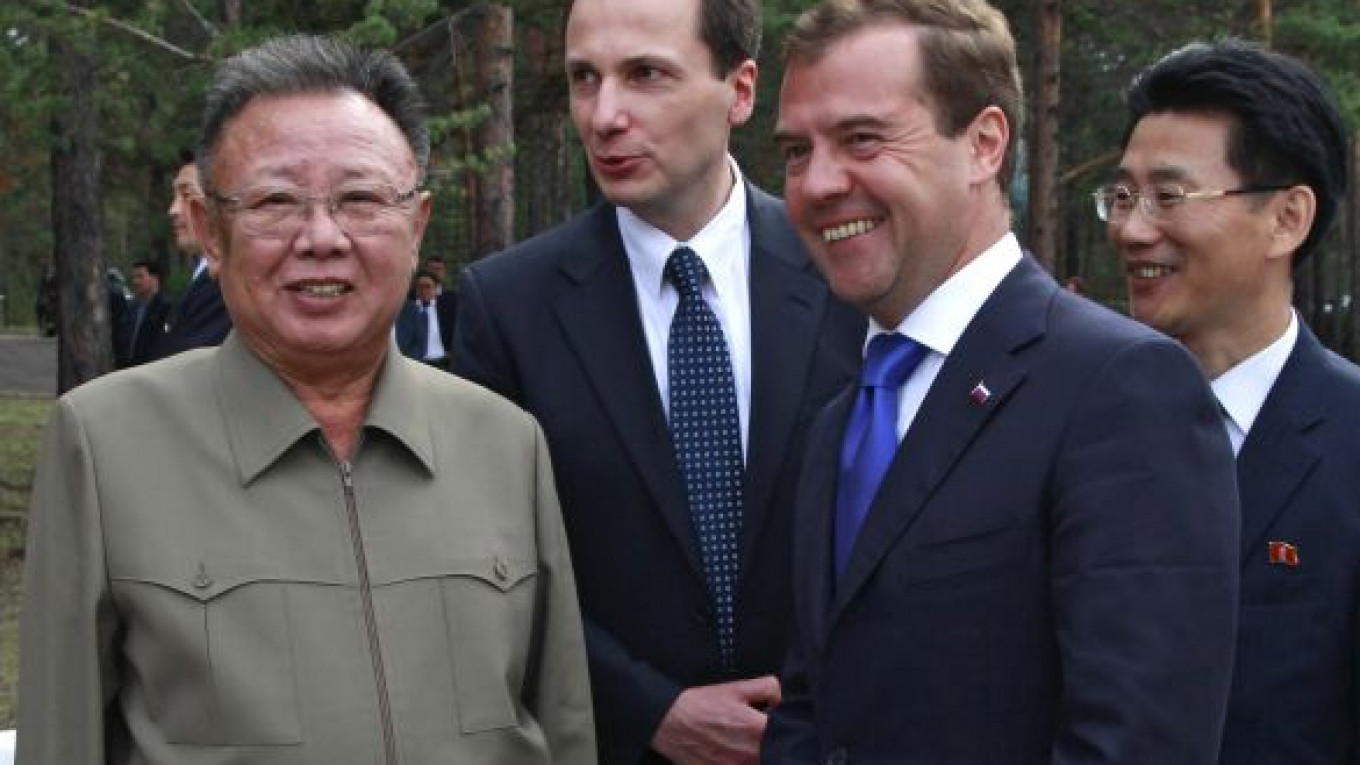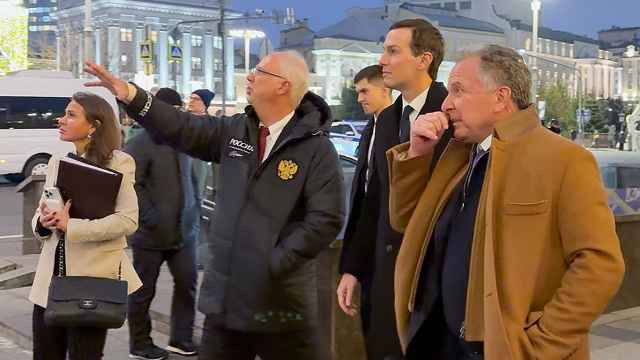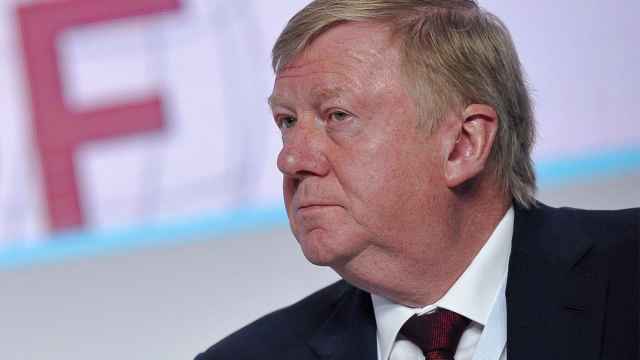The sudden death of maverick North Korean strongman Kim Jong Il cast a cloud over the future of the world's last Stalinist state, but Foreign Minister Sergei Lavrov said Monday that it should not affect relations between the two countries.
Analysts agreed that Russia is likely to remain an important trading partner of North Korea, but only if the country is not plunged into chaos by feuding clans — which, they said, is a more likely consequence of Kim's death than a gradual democratization of the closed country.
As hundreds wailed in the streets of Pyongyang in a show of mourning for the "dear leader," Asian markets reeled and South Korea readied its army, fearing provocations from the tentative successor, Kim's youngest son, Kim Jong Un.
Kim Jong Il died in his armored train Saturday, the country's official news agency KCNA Monday. He was 69.
The cause of death was the "great mental and physical strain" that he had endured on the job, said a North Korean television anchor, who burst into tears as she wrapped up her remarks.
No details were provided, but some news reports said he had suffered a heart attack. His father and predecessor, Kim Il Sung, died after a sudden heart attack at age 82. News media have reported about Kim Jong Il's health problems since 2008, when he suffered a cardiac arrest. His penchant for cigars and fine cognac has done little to help his condition, the news reports said.
Kim will be succeeded by his third son, Kim Jong Un, believed to be in his late 20s. KCNA referred to him as "the great leader" for the first time in a Monday report, Itar-Tass said.
Photographs from North Korea showed crowds of people weeping in public over Kim's death, many of them kneeling before monuments of the leader.
President Dmitry Medvedev has offered his condolences, but neither he nor Prime Minister Vladimir Putin have been invited to the funeral on Dec. 28, which will be a strictly domestic affair with no foreign dignitaries attending.
Kim is expected to be buried in the Kumsusan Memorial Palace in Pyongyang, where the embalmed body of his father is on display and maintained by the same Russian experts who maintain the body of Vladimir Lenin in the Red Square mausoleum in Moscow. It is unclear whether Kim's body might be put on display as well.
"We hope that this loss of the Korean people will not affect the development of our friendly relationship," Lavrov said, RIA-Novosti reported.
Ties between Moscow and Kim's regime run deep. Kim was, in fact, born on Russian soil in 1941, while his father was fighting in the Soviet army against Japanese forces in World War II. A Soviet birth certificate identified him as Yury Irsenovich Kim born in a village near Khabarovsk.
Russia is one of the few countries that Kim has visited, last touring it in his armored train — his only mode of foreign transportation — in August. He and Medvedev discussed economic ties at a meeting near Lake Baikal.
Bilateral trade has plummeted since Soviet times and now stands at about $100 million a year, making Russia the third-biggest trade partner for North Korea after China and South Korea.
Russia has been trying to step up its involvement in politics on the divided Korean Peninsula through economic means, proposing, among others, to create a trans-Korean gas pipeline and restore a railroad link between the two Koreas.
The pipeline deal remains under negotiation, but Russian Railways in October commenced work on the 10,000-kilometer rail line, which starts in the North Korean port of Rajin.
Hundreds of North Korean workers are also employed in the timber industry in Russia's Far East. Some of them have seized their chance to flee their home country, voicing plans to never return to North Korea.
The Russian government has criticized the Kim dynasty, which has "preserved Stalinism in its worst forms," since the 1960s, but that has not prevented Moscow and Pyongyang from collaborating, said Yevgeny Kim, a senior researcher at the Institute of the Far East with the Russian Academy of Sciences.
"We will be ready to work with any regime," Kim said by telephone from Moscow.
Kim, who has visited North Korea several times, said the country, despite its near-isolation from the outside world, is undergoing slow change, allowing limited Internet access at universities and some forms of private entrepreneurship.
A South Korean businessman working in Moscow said he hoped Kim Jong Il's death would bring about change. "We want to see who will hold the real power in the country," said the businessman, who spoke on condition of anonymity, citing the sensitivity of the issue.
Many analysts said they also wondered who would really hold power and voiced doubts that it would be Kim Jong Un, given his lack of charisma and government experience. Kim Jong Il began grooming him for succession around 2009, after losing faith in his two other sons. But Kim Il Sung spent more than a decade preparing Kim Jong Il to take over when he died in 1994.
"Kim Jong Il has been working to put in place a group of people who should facilitate the succession process for his son … and to establish multiple power centers to provide support and guidance to the heir-apparent should he suddenly pass away," said analyst Sarah McDowall of the IHS Janes Dence weekly.
But "there is now a heightened risk of an upturn in factional tensions within the North Korean political elite as senior political figures, doubting the capabilities of Jong Un, could initiate a power struggle," she said in e-mailed comments.
North Korea held a missile test on Monday, reports said, though it remained unclear whether it was a pre-planned exercise or a show of force.
South Korea put its 500,000-strong army on high alert on Monday and held talks with Tokyo and Washington, two other opponents of Pyongyang.
Regional markets slid over concerns about possible destabilization in the region, with Korea's KOSPI losing 4.1 percent, Shangai's SSE Composite down 2.5 percent and the Australian S&P/ASX down 2.3 percent, Reuters reported.
"Much will depend on whether outside forces will exert pressure on the country," said researcher Yevgeny Kim, referring to the United States and South Korea. Neither country made any demands to Pyongyang on Monday.
Raising a parallel with the Soviet Union, Kim said the possible emergence of a figure similar to progressive Soviet leader Mikhail Gorbachev could lead to the "destruction" of the North Korean regime.
But Pavel Leshakov, a Korea expert at Moscow State University, said the Soviet example has taught the North Korean elite not to embrace outright reformism, Gazeta.ru .
A Message from The Moscow Times:
Dear readers,
We are facing unprecedented challenges. Russia's Prosecutor General's Office has designated The Moscow Times as an "undesirable" organization, criminalizing our work and putting our staff at risk of prosecution. This follows our earlier unjust labeling as a "foreign agent."
These actions are direct attempts to silence independent journalism in Russia. The authorities claim our work "discredits the decisions of the Russian leadership." We see things differently: we strive to provide accurate, unbiased reporting on Russia.
We, the journalists of The Moscow Times, refuse to be silenced. But to continue our work, we need your help.
Your support, no matter how small, makes a world of difference. If you can, please support us monthly starting from just $2. It's quick to set up, and every contribution makes a significant impact.
By supporting The Moscow Times, you're defending open, independent journalism in the face of repression. Thank you for standing with us.
Remind me later.






